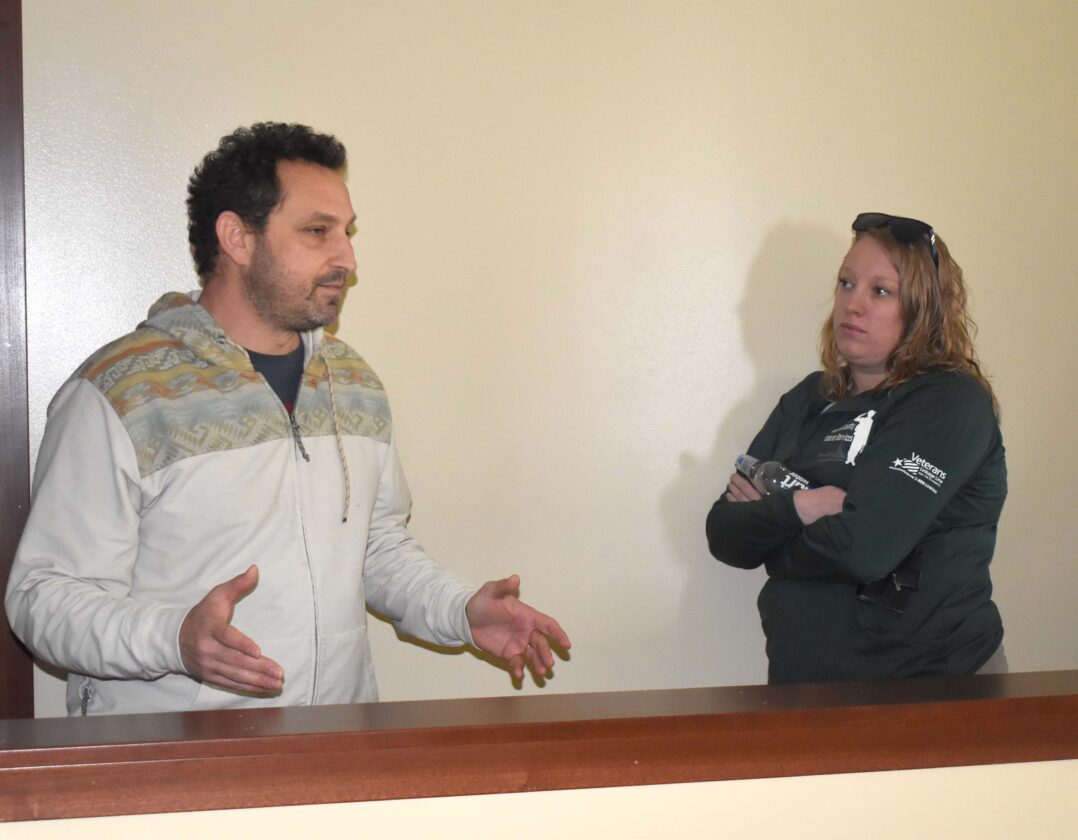Fairmont hosts Minnesota VSOs

ABOVE: Bravo Zulu House Intake Manager Mark Silverberg answers a question from McLeod County Assistant Veterans Services Officer (VSO) Brianna Lauer during the final stop of the VSO’s Thursday tour.
FAIRMONT – For Veterans Service Officers (VSOs) in southern Minnesota, as well as invitees from further out in the state, Fairmont was where they heard from state veteran leaders and speakers at Lakeview Methodist Health Care Center on Thursday.
Martin, Redwood, McLeod, Nobles, Nicollet, Brown and Watonwan are just a few of the counties that were represented by VSOs during Thursday’s meeting. They were first greeted by the commissioner of the Minnesota Department of Veteran Affairs, Brad Linsay.
Linsay served in the army, in Japan and Germany, before leaving the reserves.
“As soon as I got home, I got out because I saw the writing on the wall going back there four or five more times if I stayed in the reserves, as some of my buddies did,” he said. [Going back] also makes it hard to progress in your civilian career.”
That career started in 1999, working with the State Soldiers’ Assistance Program, then working in the Guardianship program. After a stint as a VSO, Linsay worked his way to becoming Commissioner.
A central point of Linsay’s speech was on a new executive order made by Governor Tim Walz to create a statewide food pantry for Minnesota Veterans. For VSOs working with veterans currently struggling with food insecurity, Linsay said they are currently developing a distribution system through pop-ups that will be implemented throughout Minnesota.
Next up was a training seminar with Minnesota Department of Veterans Affairs Master Trainer Todd Kubinski. He taught the VSOs about State and Federal Benefits, and what a VSO can and should do in certain situations.
Two new additions to Fairmont for veterans also got their own sections. Community Nursing Home Program Coordinator for the Sioux Falls VA Health Care System Tamara Forseth went first, speaking on VA contract nursing homes.
Currently, the Sioux Falls VA Health Care System (which also covers southwestern Minnesota, including Martin County) has 30 community nursing home (CNH) partners available. Before Lakeview was accepted as a CNH partner, Fairmont area veterans would have had to go to Mankato if they qualified under a CNH or Community Care Network (CCN) designation.
CCN is more for rehabilitation, while CNH is for long-term care placement. For older veterans, Forseth said a CCN carries an important distinction that separates it from standard Medicare.
“We don’t require what Medicare considers a qualifying hospital state to use your Medicare benefit,” she said. “You have to be in the hospital as inpatient for three overnights. We don’t require that. We just need a hospitalization.”
CNH needs veterans to meet a level of care that requires them to be in a nursing home. With a CNH authorization, semi-private room and board, nursing care and services, lab work, supplies, medication, rehab therapy and provider visits are all covered.
Lakeview Administrator Deb Barnes said they have a 72-bed capacity. Lakeview does not have a set number they allow for CNH veterans; as many as possible can be accepted as long as they do not exceed 72.
Ashley Brown followed that up by speaking on her work as Southern Minnesota’s newest Compensation and Pension examiner via her Midwest Valley Honorable Healthcare business in Granada. The business has served people from Minnesota, Iowa, Wisconsin, North Dakota, Nebraska and Germany.
A Compensation and Pension exam is a standardized and legally guided evaluation used by Veterans Affairs to determine disability ratings based on function, symptom impact and clinical findings.
By setting up in this area, Ashley and her husband, Kory Brown, have found a substantial amount of demand.
“They keep saying, ‘How many days can you open up?'” Kory Brown said. “Right now, we’re looking for another provider [to come], because we look at our forecast and we are all the way up until May, solid with seven patients a day minimum.”
The day was capped with a tour of Bravo Zulu House, an all-military sober house that recently opened in Martin County. The tour, led by Bravo Zulu House Intake Manager Mark Silverberg, went through the main building that houses residents, dog kennels for residents to take care of after 90 days in the program and a large barn space.
“We try to give people a space here that’s peaceful and where they can really work on themselves and work with each other, but also get out in the community.”
There are 11 spaces total in the house, with two currently occupied and another two being temporarily occupied by returning residents. To go along with the 11 spaces, 11 dog kennels are being constructed in a separate building to house dogs. After 90 days, they can select one of the dogs to care for and train, and even adopt when their stay is complete.
“We’ll work with them to find the right rescue for that resident,” Silverberg said. “Depending on where people are at, if they want something more active, they want a smaller dog or a bigger dog, then we pair that way. They’ll start with obedience training, and then work their way up.
The dogs will have their own space on the property to run around, which will be fenced in.
Everything wrapped up with a look over one of their larger barn-style buildings, a smaller shed that was going to be a guest space but turned into storage, and finally, the open-air fire pit available just outside the main building.
Martin County VSO Doug Landsteiner said he hopes everyone got to learn not only from the presenters but also about each other.
“It’s always good to network with colleagues and add an additional continuing education unit,” he said.

